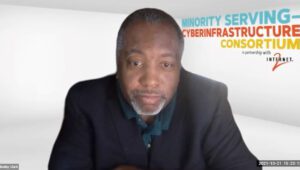By Maya Gurarie, Digital Experience Specialist
Estimated reading time: 5 minutes
Community leaders discussed a history of collaboration and how to evolve the NET+ program to meet new demands and support a changing workforce.
On October 21 the research and education cloud community gathered virtually to celebrate the NET+ Program Turns 10 milestone and discuss what to expect next. A panel featuring Sarah Christen, Cornell University, Bobby Clark, Clemson University, Jack Suess, University of Maryland-Baltimore County, and Sean O’Brien, Internet2 was led by Kevin Morooney, VP, Trust & Identity and NET+. The NET+ program brings expertise in community convening, contract negotiation and vendor management at scale. As the program continues to expand, we seek to engage the community through working groups, special events and advisory committees.
“Together we can do things we could never have done alone. As we are looking at NET+, it’s about getting people re-engaged in the NET+ activities, taking advantage of service advisory boards, and really helping to change the way that vendors want to deal with us. We need that next generation to come in and take ownership of this and really help lead us to the next level,” said Jack Suess, Vice President of IT and CIO, University of Maryland-Baltimore County.
Shaping Cloud Services for Research and Education
Some educational institutions prioritize cloud use, while other institutions utilize services as opportunities arise. The NET+ program grew out of a forum hosted in 2010 about cloud services and learnings from efforts like the InCommon certificate program. This collaboration brought in more universities to consider how they can work together in higher education for authentication, common contracts, strategies, and toolsets.
Vendor Management at Scale
Beyond negotiating strong contracts, the NET+ program helps with utilizing vendor management at scale. Cloud providers are becoming more innovative in the services they roll out, so there is high demand for universities to subscribe to their services. NET+ brings several universities together to broker discussions with the vendors about unique needs in higher education. This process benefits the cloud providers, too.
Recently NET+ created the Business Procurement and Legal Advisory committee, BPLAC, to further engage a broad set of stakeholders around needs in contract and vendor management.
 Bobby Clark, Clemson University
Bobby Clark, Clemson University
“The adventure of the (BPLAC) committee is to improve that community in my opinion. We want to do that not only with NET+, but also in other groups such as the Minority Serving-Cyberinfrastructure Consortium to broaden our reach. Beyond the terribleness we have had with the pandemic, it has presented a challenge to most universities that they must be involved in this kind of infrastructure building if they’re going to survive what’s coming in the future,” said Bobby Clark, chair of the NET+ Business, Procurement, and Legal Advisory Committee. Listen to the soundbite.
Educating the workforce is important because people are leaving higher education for various reasons. In an article by the Brookings Institution, this issue is compounded by universities not filling vacant jobs due to hiring freezes. Higher salaries in industry, teleworking options, and retirement benefits make staff retention challenging. The NET+ service connects experts with different skill sets to support collaborative evaluations. Internet2 utilizes the scale of the community to develop, vet, and provide services and software to empower research and education.
As the NET+ program matures, leaders in working groups are broadening the reach to more institutions. They’re offering guidance on cyberinfrastructure development, IaaS adoption, SaaS accessibility, and risk management for data compliance and accessibility. These are services that many research institutions are increasingly reliant on, but community leaders see value in seeking smaller colleges and universities to adopt NET+ services and join the community discussion.
“In the last 10 years the number of software-as-a-service vendors has exploded. What that means, at least to us at Cornell, is hundreds of solutions where people can buy off the shelf. We have cloud software purchases in every department and every college. It increases the risk at our university. Internet2 as a community can figure out how to work through that risk landscape and how to navigate it. The risk is in places like privacy and security, and data compliance and regulation, and accessibility. I know that there is a group working on the (cloud) scorecard, which is a huge step in the right direction,” said Sarah Christen, Director of IT Infrastructure, Cornell University.
Introducing the Internet2 Cloud Scorecard
One way R&E institutions are looking to manage the growth of cloud services on campus is through collaborative questionnaires. Panelists discussed the Cloud Scorecard as one new way the community can work on navigating a complicated ecosystem.
At the Cloud Scorecard webinar on November 3 at 2 p.m. ET, the NET+ team is looking forward to talking about the community’s ability to acquire and deploy these services more efficiently.
Future Community Convening and Efforts
Finally, NET+ organizers are thinking about how to convene differently. They are balancing the challenge of hosting larger meetings across higher education about NET+ services within supportive, small groups. Internet2 will continue to host events to further these conversations and cultivate resources within the community.
An example of one of these meetings that impacts the community is the Cornell Cloud Forum. Since 2015, the Cloud Forum has been the place where higher education cloud leadership meets to share their successes and failures, ask tough questions, and seek consensus on best practices. This year several Cloud Forum sessions will be part of TechEXtra virtual events including lightning talks and research presentations for the Cloud Infrastructure and Services track on November 16-18.